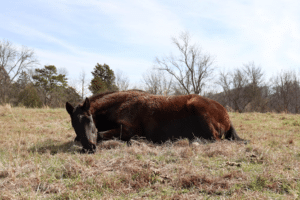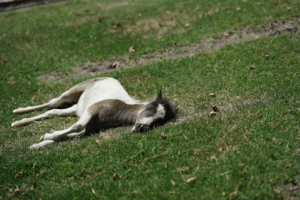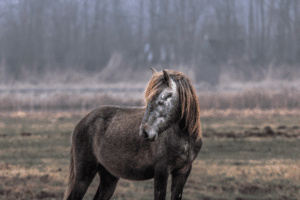Why Do Horses Lay Down?
 It's fun to discover your horse lying down in his stall enjoying a snooze. Usually, you only get a brief glimpse before they stand up to say hello. On an average day, horses spend about 90% of their time standing up, which is why seeing your horse lying down can be a surprising sight.
It's fun to discover your horse lying down in his stall enjoying a snooze. Usually, you only get a brief glimpse before they stand up to say hello. On an average day, horses spend about 90% of their time standing up, which is why seeing your horse lying down can be a surprising sight.
Seeing a horse laying down might make you wonder: “when do horses lay down?” or “what does it mean when a horse lays down?” You might even start to worry when you see your horse lying down on the ground for the first time.
However, normally, there’s no need to worry. Horses usually lay down for a couple hours each day during deep sleep, or when they feel safe and relaxed. Your horse might lie down if he’s very tired after a long training session. Lying down is a normal and healthy behavior for horses, and most of the time it means your horse is calm, sleepy, and relaxed.
What Does It Mean When a Horse Lays Down?
There are three main reasons why horses lay down. Here we’ll dive into all three so you can figure out if your horse’s behavior is normal or if it’s time to schedule an appointment with the vet.
Reason #1: Your Horse Is Tired
A very normal reason why horses lay down is because they are tired. Just like their riders, horses get tired after a long training session and often want to find a nice cozy place to take a nap. That might be in the straw in their stall or out in the grass under the warm sun. Wherever your horse’s favorite naptime spot might be, if he feels comfortable and safe, it’s completely normal to find your horse lying down after training.
Reason #2: Your Horse Is Sick or Hurting
Do horses lay down when they are sick? Horses can lay down when they are not feeling great, when something is hurting them, or when they are sick. The faster you realize your horse is sick, the faster you’ll be able to help them feel better and prevent further injuries and ailments. If your horse is sick, lying down for long periods of time can actually be dangerous and cause further damage to your horse’s organs and limbs.
That’s why it’s so important for horse owners to know their horses well and to be familiar with their behaviors, attitudes, and sleeping patterns. If you see your horse laying down more often than usually, you’ll know that something is off.
If your horse is lying down because he’s sick or hurting, there’s two common health problems that might be the cause – musculoskeletal pain and colic:
- Musculoskeletal pain can be caused by things like ligament and tendon injuries from excessive training, falls and accidents, osteoarthritis, or laminitis (a painful disease that affects a horse’s feet).
- Colic is a common disease in horses that causes extreme stomach pain and gastrointestinal problems. This is usually cause by a change in diet, overeating grain, or stomach hernias or tumors. You can prevent colic in your horses by frequently deworming and feeding your horse the right prebiotics. This injection can kill parasites and keep your horses digestive track safe and clean: Durvet Ivermectin Injectable
But why does a horse lay down when it has colic? A horse that is in pain will lie down more frequently to ease the joint pain in their limbs. Horses with colic sometimes lie quietly on the ground or other times roll on the ground due to the stomach pain they are experiencing. It’s important to contact your vet as soon as possible if you suspect your horse is experiencing colic.
Reason #3: Your Horse Is Sleeping

It’s much more common to find foals lying down in the barn or outside in the pasture. Since they are growing, colts and fillies will spend much more time sleeping than an adult horse.
Everything You Need to Know About Horse Sleep Cycles
Horses have very unique sleep patterns, and really don’t need that much sleep (especially when compared to humans). Horses have polyphasic sleep routines – which means they sleep multiple times throughout the day rather than just once. They have two different types of sleep – deep REM sleep or slow wave sleep.
About 85% of the time when horses sleep, they are in slow wave sleep. This is a shallow sleep stage that allows the horse to rest and recharge while staying somewhat alert. During slow wave sleep, your horse sleeps standing up. He might hang his head down and close his eyes to relax while he’s sleeping.
So why do horses lay down to sleep? Well, the second type of sleep – deep REM sleep – is a much more refreshing sleep for your horse. While it’s true that your horse spends much less time in REM sleep, this type of sleep is essential for preventing sleep deprivation and keeping your horse healthy.
Horses can’t go into REM sleep when they are standing up, so when you see your horse lying down and sleeping, he’s most likely in this sleep stage.
Why Do Horses Sleep Standing Up?
All horses have a unique mechanism called the “stay apparatus” that allows them to lock their legs and sleep standing up. Their ligaments and tendons lock the muscles into place and allows them to shift their body weight onto the locked limbs so that they can relax and sleep.

How Much Sleep Does a Horse Need?
On average, horses sleep around 3-4 hours a day, according to a scientific review of equine sleep. Of those 3-4 hours of sleep, a well-rested and healthy horse gets around 30 minutes of REM sleep. This sleep time isn’t in one period, but rather broken up into shorter periods of time.
For example, a horse might slowly drift to sleep while standing up and sleep for 15 minutes. Then, if he feels safe and relaxed, he might lie down and go into a deeper sleep for five to ten minutes. Then maybe he’ll stand up and rest for a while, and continue repeating this pattern throughout the night.
Can Horses Lay Down for Too Long?
Since horses are such large animals – weighing between 900 to almost 2,000 pounds – when horses lie down, it puts a lot of pressure and weight on their organs. These majestic animals were designed to spend most of their lives standing up, walking, and trotting around. Lying down for too long can actually cut off circulation and lead to serious health problems. That’s why the answer to the question “can horses lay down for too long?” is yes.
So, now you know! If you see a laying down horse, don’t be alarmed, he’s probably just taking a nap or relaxing. But, do make sure you are aware of your horse’s behavioral patterns, if you notice that he’s lying down frequently or seems lethargic and different than normal, don’t hesitate to reach out to your vet for suggestions and specialized advice.
Frequently Asked Questions
When do horses lay down?
Unlike humans, horses don’t lay down to go to sleep at night. Horses can lay down at any moment throughout the day, when they feel tired or are entering a deeper sleep. It’s common to find your horse laying down after a long training session or when they feel safe and relaxed.
Is it normal for horses to lay down during the day?
Yes, it is normal to find your horse lying down during the day. Horses often lay down in their stalls or outside on the grass when they are tired or sleeping deeply. However, if your horse is laying down a lot more than normal or has other signs of illness, lying down frequently could mean that he’s sick or hurting.
How can I tell if my horse has colic?
Some signs that your horse has colic include: lying down quietly, rolling on the ground, biting or kicking at their stomach, difficulty urinating or defecating, and changes in eating behavior. While seeing your horse laying down could be a sign that he is sick or in pain, this is not always the case – look for other signs and talk to your vet if you suspect your horse has colic.
Keep your horse safe from parasites and worms by using this equine dewormer.

